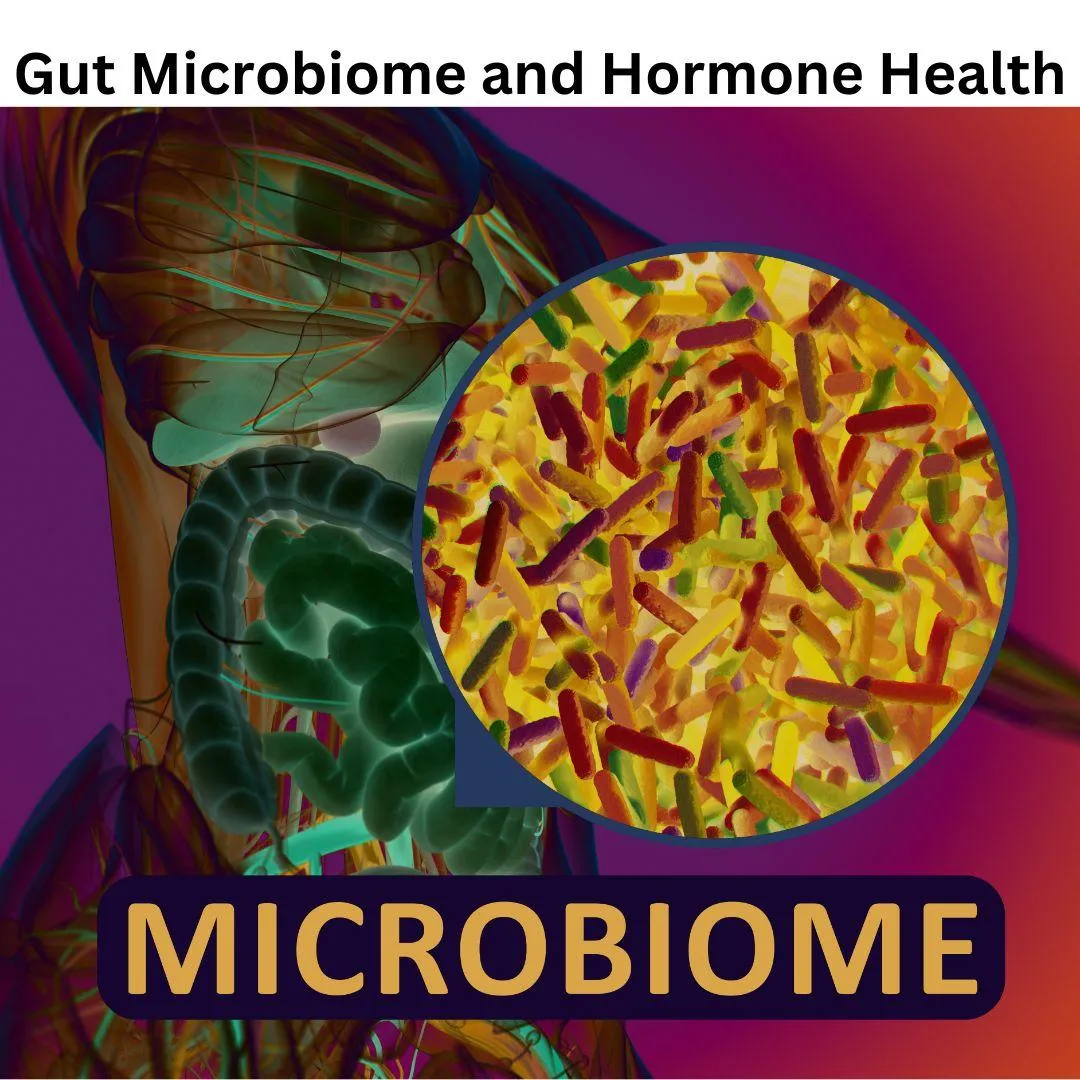*Open to Florida Residents
Blog
Blog

Gut Microbiome and Estrogen Health
The gut microbiome houses an extensive array of enzymes engaged in diverse metabolic pathways, ranging from synthesizing essential nutrients to breaking down complex carbohydrates and transforming metabolic products such as conjugated estrogen. Within this intricate system, the estrobolome plays a pivotal role in maintaining estrogen homeostasis. Its functions encompass both the elimination and recycling of estrogens, ensuring the harmonious estrogen balance. Estrogen is a group of hormones essential for various physiological functions in women, including the menstrual cycle, fertility, and bone health. When estrogen is metabolized, it forms different metabolites some of which are less biologically active and easily excreted, while others are more potent. The balance of these metabolites is crucial for maintaining hormonal equilibrium.
The Estrobolome is a term used to refer to the collective composition of the gut microbiome that is capable of metabolizing estrogens. The interplay between the estrobolome, gut microbes, and hormones is important in maintaining homeostasis particularly in women where estrogen plays multiple critical roles.
The metabolizing of estrogens occurs through a process called deconjugation. Certain bacteria in the gut contribute to the production of beta-glucuronidase an enzyme that can reactivate estrogen metabolites that were meant to be excreted. The estrogens are initially inactivated in the liver and then excreted into the bile before being sent to the intestines where the estrobolome can convert them back into their active form. This process known as enterohepatic circulation enables the reuptake of active estrogens back into the body.
An important aspect of the estrobolome function is its influence on the estrogen balance within the body, as it directly impacts the levels of free estrogen. This is crucial not only for reproductive health but for various other physiological systems, as estrogens play significant roles in cardiovascular health, bone density, mental cognition, and even body weight.
Alterations in the estrobolome caused by the dysbiosis of gut microbes have been linked to health issues for women. Gut dysbiosis can disrupt the normal metabolism of estrogen by the estrobolome. When the balance of beneficial and harmful bacteria in the gut is disturbed, it can influence the activity of enzymes. Elevated levels of beta-glucuronidase often associated with gut dysbiosis can lead to the reactivation of estrogen metabolites that were meant to be excreted, potentially increasing the risk of hormonal imbalances.
Gut dysbiosis often results in increased intestinal permeability (leaky Gut) and inflammation. Inflammatory processes can affect the estrobolomes function and contribute to alterations in estrogen metabolism. Additionally, dysbiosis-induced inflammation may trigger an immune response that can impact hormone balance.
Changes in the estrobolome due to gut dysbiosis can have implications for reproductive health. Women may experience disruptions in menstrual cycles, increased severity of premenstrual symptoms and challenges during the perimenopausal and menopausal transitions. The altered estrogen metabolism may contribute to conditions such as polycystic ovary syndrome (PCOS). Several research studies have shown that PCOS women have a less diverse gut microbiome including decrease in the enzymes needed for the deconjugation of estrogen compared to women without PCOS.
Gut dysbiosis can influence the gut-brain axis, a bidirectional communication system between the gut and central nervous system. So much recent research has begun to show how this is an important influence on our overall health. This axis plays a role in regulating hormonal balance and disturbances in gut microbiota can affect this communication. These changes influence the estrobolome and estrogen metabolism.
And for women who do take Hormone replacement therapy gut dysbiosis may impact how you respond. The altered metabolism of estrogen in the presence of dysbiosis may affect the potency of hormone therapies, potentially requiring adjustments in treatment approaches.
Addressing gut dysbiosis becomes paramount in enhancing women’s overall well-being emphasizing the holistic interconnectedness of gut health and hormone health.
In conclusion, fostering a healthy estrobolome relies on conscientious choices in diet and lifestyle. Prioritizing a diet abundant in fiber and resistant starches, alongside maintaining robust elimination practices helps maintain an optimal balance of your gut microbiome. Avoiding excesses in alcohol, sugar, processed foods antibiotics, and minimizing exposure to chemical toxins is pivotal in averting microbial imbalances.
We need to nurture our estrobolome and gut health through botanicals, prebiotics, probiotics and a plant-based diet, as our knowledge grows of the intricate world of our gut microbiomes deepens, it becomes evident that actively supporting and optimizing their diverse roles is integral to preserving our hormone health on multiple levels.

Gut Microbiome and Estrogen Health
The gut microbiome houses an extensive array of enzymes engaged in diverse metabolic pathways, ranging from synthesizing essential nutrients to breaking down complex carbohydrates and transforming metabolic products such as conjugated estrogen. Within this intricate system, the estrobolome plays a pivotal role in maintaining estrogen homeostasis. Its functions encompass both the elimination and recycling of estrogens, ensuring the harmonious estrogen balance. Estrogen is a group of hormones essential for various physiological functions in women, including the menstrual cycle, fertility, and bone health. When estrogen is metabolized, it forms different metabolites some of which are less biologically active and easily excreted, while others are more potent. The balance of these metabolites is crucial for maintaining hormonal equilibrium.
The Estrobolome is a term used to refer to the collective composition of the gut microbiome that is capable of metabolizing estrogens. The interplay between the estrobolome, gut microbes, and hormones is important in maintaining homeostasis particularly in women where estrogen plays multiple critical roles.
The metabolizing of estrogens occurs through a process called deconjugation. Certain bacteria in the gut contribute to the production of beta-glucuronidase an enzyme that can reactivate estrogen metabolites that were meant to be excreted. The estrogens are initially inactivated in the liver and then excreted into the bile before being sent to the intestines where the estrobolome can convert them back into their active form. This process known as enterohepatic circulation enables the reuptake of active estrogens back into the body.
An important aspect of the estrobolome function is its influence on the estrogen balance within the body, as it directly impacts the levels of free estrogen. This is crucial not only for reproductive health but for various other physiological systems, as estrogens play significant roles in cardiovascular health, bone density, mental cognition, and even body weight.
Alterations in the estrobolome caused by the dysbiosis of gut microbes have been linked to health issues for women. Gut dysbiosis can disrupt the normal metabolism of estrogen by the estrobolome. When the balance of beneficial and harmful bacteria in the gut is disturbed, it can influence the activity of enzymes. Elevated levels of beta-glucuronidase often associated with gut dysbiosis can lead to the reactivation of estrogen metabolites that were meant to be excreted, potentially increasing the risk of hormonal imbalances.
Gut dysbiosis often results in increased intestinal permeability (leaky Gut) and inflammation. Inflammatory processes can affect the estrobolomes function and contribute to alterations in estrogen metabolism. Additionally, dysbiosis-induced inflammation may trigger an immune response that can impact hormone balance.
Changes in the estrobolome due to gut dysbiosis can have implications for reproductive health. Women may experience disruptions in menstrual cycles, increased severity of premenstrual symptoms and challenges during the perimenopausal and menopausal transitions. The altered estrogen metabolism may contribute to conditions such as polycystic ovary syndrome (PCOS). Several research studies have shown that PCOS women have a less diverse gut microbiome including decrease in the enzymes needed for the deconjugation of estrogen compared to women without PCOS.
Gut dysbiosis can influence the gut-brain axis, a bidirectional communication system between the gut and central nervous system. So much recent research has begun to show how this is an important influence on our overall health. This axis plays a role in regulating hormonal balance and disturbances in gut microbiota can affect this communication. These changes influence the estrobolome and estrogen metabolism.
And for women who do take Hormone replacement therapy gut dysbiosis may impact how you respond. The altered metabolism of estrogen in the presence of dysbiosis may affect the potency of hormone therapies, potentially requiring adjustments in treatment approaches.
Addressing gut dysbiosis becomes paramount in enhancing women’s overall well-being emphasizing the holistic interconnectedness of gut health and hormone health.
In conclusion, fostering a healthy estrobolome relies on conscientious choices in diet and lifestyle. Prioritizing a diet abundant in fiber and resistant starches, alongside maintaining robust elimination practices helps maintain an optimal balance of your gut microbiome. Avoiding excesses in alcohol, sugar, processed foods antibiotics, and minimizing exposure to chemical toxins is pivotal in averting microbial imbalances.
We need to nurture our estrobolome and gut health through botanicals, prebiotics, probiotics and a plant-based diet, as our knowledge grows of the intricate world of our gut microbiomes deepens, it becomes evident that actively supporting and optimizing their diverse roles is integral to preserving our hormone health on multiple levels.
Let me help you achieve your goals.
Disclaimer: We understand that every individual's experience is unique and results may vary depending on various factors, such as attitude, adaptability, personal history, and overall health. For your safety and well-being, we highly recommend consulting your physician before beginning any program. At Elite Sexual Hormone Health, we do not diagnose, treat, or prescribe any medical or psychological disorders. We urge you to seek the care of a qualified physician or psychotherapist if you suffer from any psychological or medical disorder. Thank you for choosing Elite Sexual Hormone Health as your partner in your journey towards wellness.
© 2025, Elite Sexual Hormone Health. All rights reserved.
Privacy Policy | Terms of Service | Disclaimer
© 2025, Elite Sexual Hormone Health. All rights reserved.
Website by Hypnotherapy Accelerator





